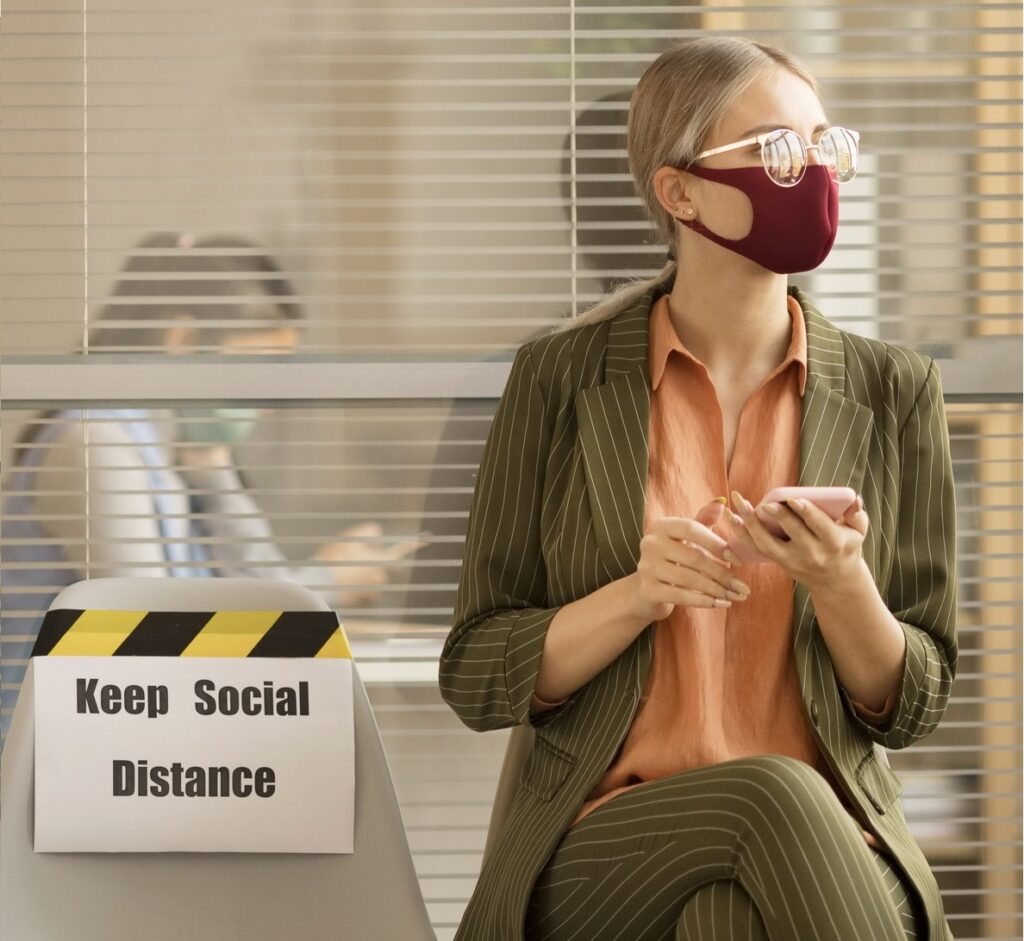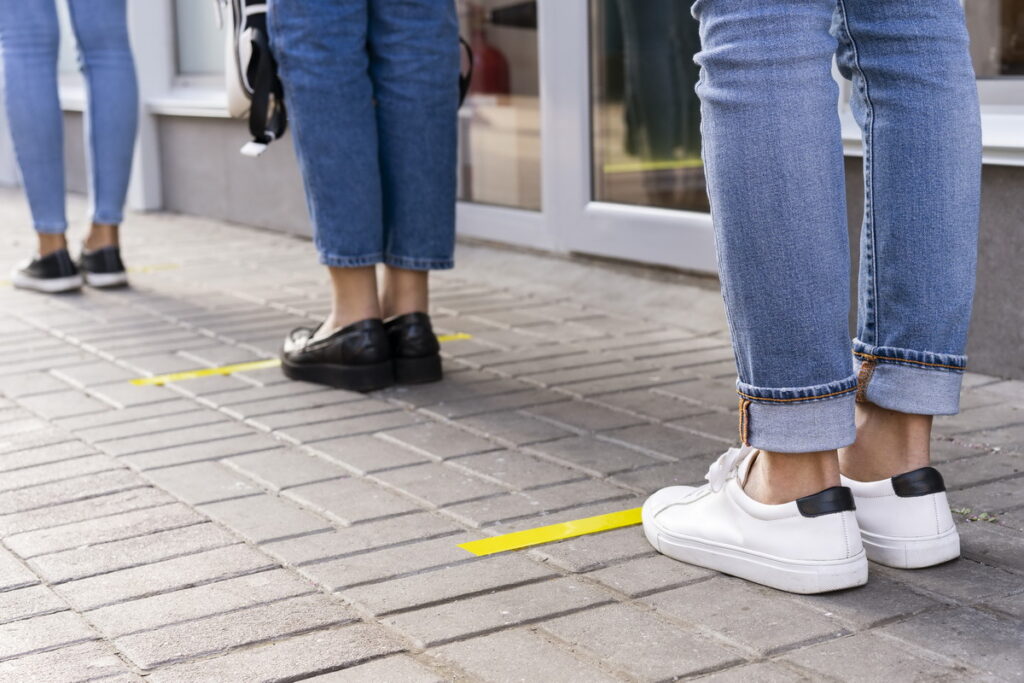Hitting the Reset Button on Office Safety
As we venture back to our offices and workplaces, staying protected against the coronavirus is likely prevalent in our thoughts. Although working in a sanitary office should always be an important objective, you and your staff might not take it for granted as much as before. Some of those workers might even feel nervous about returning to the office, despite the uptick in vaccines and what currently looks like a decline in COVID-19 cases in the U.S.
Many of us are still a little on edge about being in enclosed offices, especially with the reality of coronavirus staying with us for the long term. With those worries in mind, it’s more important than ever that regular office disinfection be part of the workplace routine. We already do our part by washing our hands and applying other measures to reduce exposure to the dreaded COVID-19. Office managers can contribute to the effort by making sanitation part of the day-to-day operations.
For office disinfection to be a priority, businesses should be willing to allocate person-hours and resources. However, in light of pandemic-related lost revenue and business downturns, it can be challenging for some companies to find the money to maintain cleanliness in the office.
Moreover, some products currently available contain chemicals that do enough harm to counteract the benefits they intend to bring, and some companies have to use these products in large quantities. A high-quality disinfectant shouldn’t break your budget or leave behind harmful toxins. Avrika is effective, non-toxic, and works in small amounts, making it cost-effective. Also, compared to other chemicals and compounds, Avrika works better with one application, is non-corrosive, doesn’t stain, and has been tested on viruses generated by humans.
Importance of Office Disinfection
Keeping office inventory sanitary involves both cleaning and disinfection. Although it’s easy to throw these terms around, the distinction between them is crucial. Cleaning involves regular washing and wiping down surfaces with soap and water or a cleanser to remove dirt and dust. As you probably know, cleaning also means using towels or cloth rags to pick up dirt and unsightly things that don’t belong in the environment. Cleaning by itself doesn’t remove pathogens, but removing dirt can eliminate their presence.
A clean area isn’t necessarily free of germs, viruses, or bacteria. That’s where disinfection comes in. Disinfectant products go beyond cleaning by removing those disease-spreading substances directly. Although office disinfection doesn’t have to accompany every routine cleaning, the Centers for Disease Control and Prevention (CDC) advise that disinfection is necessary when the risk of exposure to a contagious illness exists. Because the coronavirus and its variants will be around for a while, regular use of at least one disinfectant should be a part of everyday office sanitation.
When putting together an office cleaning procedure, it’s essential to define how surfaces and spaces will be disinfected when staff return in full force. The CDC recommends making your plan flexible enough so that cleaning staff can adapt to changes in municipal, state, federal, or tribal regulations.
Upticks in COVID-19 rates require offices to ramp up their cleaning efforts. For some businesses, this means additional cleaning staff hours or buying more cleaning products, which can be costly. The best way to meet regulations in a cost-efficient way is by using a disinfectant like Avrika, which is efficient enough to use in small amounts. This means eliminating the need for more cleaning staff or extra products.
Carrying Out Office Disinfection
To put an effective office disinfection routine in place for when all staff return, the first thing to tackle is identifying common or high-traffic areas and surfaces that often come in contact with viruses and bacteria.
Start by inspecting one physical area at a time. This means areas that get a lot of use:
- Reception areas
- Hallways
- Conference rooms
- Kitchens and break rooms
- Mailroom
- Storage spaces
- Individual offices
When checking each room or space, make a note of surfaces that people commonly touch, including:
- Automated teller machines (ATMs)
- Cabinets and handles
- Countertops
- Chairs and chair backs
- Coat racks and hangers
- Desks and tables
- Doorknobs
- Elevator buttons
- Faucets
- Light switches
- Sinks
- Toilets
Smaller surfaces and objects collect a lot of pathogens as people touch and use them. These items include:
- Computer mice
- Keyboards
- Phones
- Staplers
- Scissors
- Tape dispensers
- Touch screens
Taking office inventory usually means striking a balance between aesthetics and practicality. You might have pieces of furniture, equipment, or other items that are best to move or remove. That’s because things like rugs and fabric furniture can be challenging to disinfect.
However, it might not be feasible to remove all porous objects like doormats or furniture in a reception area. Even if you find that disinfecting these items isn’t easy or worthwhile, it’s still important to clean or launder them regularly since many people will come in contact with them regularly. When using Avrika just a few times each year, staff can meet their cleaning and maintenance needs without adding any extra costs or labor burden.
Don’t overlook surfaces in outdoor areas because they will now need regular cleaning. However, they generally can go without disinfection. Using a disinfectant spray outside and on sidewalks can be wasteful because more of it will end up in the air than on the targeted objects.
Outdoor plastic or metal objects are the exceptions to the “don’t disinfect” rule. Playground equipment, picnic tables, grab bars, and railings require regular cleaning and disinfection.
The CDC has interesting facts about the coronavirus, and they give guidance for reducing the risk of exposure. Although the coronavirus might only live for hours or days on surfaces, there is still a need for regular cleaning with soap and water. Make sure you clean thoroughly before you disinfect. Using a disinfectant for coronavirus after cleaning can kill germs and can also reduce infection risk.
For as long as we’ll be living with COVID-19, once-daily cleaning and disinfecting won’t cut it for surfaces that lots of people touch frequently. These high-contact objects include:
- Desks
- Doorknobs
- Light switches
- Phones
- Toilets
- Faucets
Whenever possible, these surfaces should get disinfection after every use. For example, keeping wipes near a shared phone can encourage people to use them before and after making a call.
Ramping up disinfection is also a good idea during peak flu season or when everybody seems to be catching a common cold. Schools, universities, and other educational institutions can stay ahead of the game by doing complete disinfection at the beginning of the school year or between terms. Finally, offices might build up disinfection efforts ahead of organization-wide meetings, holiday events, and other mass gatherings.

Most products need to be applied frequently, especially when offices need to increase their disinfection efforts, such as during a disease or illness epidemic (Coronavirus won’t be the last one!). This doesn’t have to mean using more product or applying it in larger quantities. Instead, workplaces can replace high-use supplies with Avrika, which is effective even in smaller amounts. Doing so eliminates the need to disinfect frequently, even when the risk of viral infection is high.
Businesses need a disinfection plan in case an employee tests positive for COVID-19. If a worker tests positive within the last 24 hours, the areas they occupied and touched should undergo cleaning and disinfection. Once you close off the affected area, it’s best to wait 24 hours or as long as possible before disinfecting. Don’t forget to keep the air circulating by opening windows and doors and running fans. Make sure cleaning personnel are wearing gloves and masks during the disinfection process.
The CDC recommends that all cleaning staff should get training on how to recognize COVID-19 symptoms. Staff should also know and carry out the proper protocols for protecting themselves. A good starting point is wearing the appropriate personal protective equipment (PPE) and learning how to use and dispose of it.
The CDC probably doesn’t need to tell you how important it is to follow the instructions on disinfectant products’ labels when using or storing them. Janitorial staff must always wear gloves when using these products. They also shouldn’t mix them with bleach or other cleaners to avoid coming in contact with dangerous fumes. As with any disinfectant spray or other product, keep it out of children’s curious hands.
There’s no single office disinfection plan that works for every business. The key is to maintain the kind of schedule and the products that meet your needs. You’ll always need a daily cleaning routine to remove surface-level dirt and dust. On top of that comes disinfection, but you can do this less often under normal circumstances if there is such a thing as “normal” these days.
Whether or not there’s a public health scare lurking around every corner, offices should always encourage a culture of safety by promoting handwashing and wearing face coverings when necessary. Staff shouldn’t feel guilty for staying home if they’re sick, and the company should have on hand enough hand sanitizer for when handwashing isn’t possible. It’s also a good idea to keep disinfecting wipes to make it easier to disinfect commonly used surfaces after each use.
Using the Right Products
As we’ve said before, cleaning alone doesn’t do enough to remove the coronavirus and other contagions from objects and surfaces. However, using high-quality disinfectant sprays and other products according to the product label can kill the virus that causes COVID-19, especially on surfaces that many people touch or use.
It’s no doubt that office disinfection can amount to considerable investment, and it doesn’t help that many conventional products can be expensive. That’s because they need repeated applications in just one day. Other products evaporate too quickly after making surface contact, which offers little to no protection against SARS-CoV-2 and other germs and bacteria. Moreover, some disinfectants are toxic, making them too dangerous to use on surfaces that children might touch.
Avrika: The Solution for the New Normal
Avrika Life is a biotechnology company headquartered in Overland Park, Kansas. Its mission is to develop disinfectant solutions to tackle contemporary and unique threats to safety and health. The company specializes in hygiene, antimicrobial and fungicidal cleaning solutions, PPE, and SARS-CoV-2 solutions.
The company is introducing its flagship product, Avrika, a game-changer in the fight against COVID-19. With its 99.9% efficacy, Avrika is the most scientifically advanced disinfectant on the market. It attacks and kills 220 germs, bacteria, and viruses, including SARS-CoV-2.
Just one application of Avrika provides at least 30 days of protection at 99.9% for each of those 30 days (in some cases, up to 90 days), making it the highest performing disinfectant you can buy. Because it only requires a single-use, Avrika is up to 75 times more cost-effective than other disinfectant products you might see on the market.
The company has developed Avrika to work on porous and non-porous areas within almost every base layer. As many as 65 independent tests in globally recognized labs can verify this. The product is also non-toxic and has no adverse effects on the environment.
How Avrika Works
Avrika’s effectiveness in killing SARS-CoV-2 and over 100 other viruses comes from its straightforward molecular structure. Each Avrika particle contains different ions encased in a shield-like coating. When Avrika is dispensed, its protective coating disintegrates, releasing the ions that kill the coronavirus. With just one use, these virus-fighting ions help create a defensive buffer, kill the virus, and keep people safer when they contact the disinfected surfaces.
In addition to eliminating the virus that causes COVID-19, Avrika Life Solution can protect against coronavirus variants, and other pathogens and harmful substances. You will also appreciate that it’s odorless, non-toxic, and anti-inflammatory.
Avrika won’t harm people with allergies, and users don’t need to worry if it unintentionally makes contact with skin. Avrika is also good for surfaces used for food preparation. It also doesn’t leave a stain on disinfected objects or surfaces. This means you can confidently use Avrika in areas that get a lot of traffic and are visible to customers or clients.
Virtually any public venue can benefit from Avrika. It works well in various settings:
- Arts venues
- Sports arenas
- Businesses and retail
- Community meeting sites
- Educational institutions
- Environmental and sanitation services
- Faith-based organizations and places of worship
- Hospitals, nursing homes, clinics, and other healthcare settings
- Hotels, restaurants, and bars
- Manufacturing facilities
- Public transit stations and facilities
- Warehouses and wholesale retailers
Perhaps you’ve felt the economic and operational disruptions that the coronavirus has brought to most businesses. It’s certainly changed how staff and management run their businesses to remain profitable, or perhaps just to survive.

Avrika is a revolution in biotechnology, providing the disinfection solution that helps ensure operational continuity, even in the face of the most severe public health threats. It’s also a money-saving product that helps companies handle future health crises and minimizes their negative economic impacts. Most importantly, Avrika will reduce the risk of exposure to life-threatening illnesses in your workplace and even saves lives.
It’s worth the time and effort to think carefully about the disinfectant for coronavirus you choose. Reopening offices and getting back to work is in everyone’s interest, but it needs to happen safely.
Take your office disinfection plan to the next level by visiting avrika.life to learn more about their products and how to get in touch with the company. See what Avrika can do to safeguard your workforce and prevent the coronavirus and other pathogens from threatening the survival of your business.
